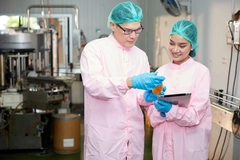How Gencor’s Levagen+ PEA ingredient influences the gut microbiome

The gut has been called the body’s second brain, a place where bacteria number in the trillions and play a role in everything from digestion to mood. Gencor believes it may have found a way to change how that brain behaves without altering what lives there. The company has released new data on Levagen+, its patented form of palmitoylethanolamide (PEA), suggesting the ingredient can influence gut microbial activity, reduce intestinal inflammation, and even lower triglycerides.
“Healthy weight management remains a top priority for consumers, and dietary supplements are often sought before drug interventions,” says Ramasamy Venkatesh, managing director of Gencor Pacific. “To our knowledge, this is the first study to examine the specific changes in microbiome function after PEA supplementation.”
A controlled test
Published in Biomedicines, the study included 58 overweight but otherwise healthy adults, aged 18 to 65 with BMIs between 30–40%. Participants were divided into two groups: 36 received Levagen+ daily for 12 weeks, while 22 received a placebo. The trial was randomized, double-blind, and placebo-controlled.
What the researchers found is telling. Those taking Levagen+ showed significant improvements in IL-2 concentrations, a marker that suggests reduced intestinal inflammation. They also recorded lower triglyceride levels.
The bacteria themselves — the cast of microbes — did not shift much in composition. What changed was their behavior. Pathways linked to aromatic compound degradation, NAD+/NADH and NADP+/NADPH interconversion, and L-glutamate degradation were downregulated. Others, such as molybdopterin and O-antigen biosynthesis, were upregulated, hinting at altered immune responses and metabolic processes.
“This study found that Levagen+ helped reduce markers associated with both gut inflammation and blood fats (triglycerides),” Venkatesh explains. “Although it didn’t alter the overall composition of gut bacteria, it did change how those bacteria function — reducing some pathways related to energy breakdown and increasing others that help beneficial bacteria build protective structures.”
He adds, “Overall, the findings suggest that PEA not only supports a healthier gut-immune balance but may also contribute to improved metabolic health.”
Beyond the petri dish
PEA itself is not new. It is produced naturally in the body, a fatty acid amide released in response to stress and injury. Standard PEA, however, has low bioavailability, which has long been its limitation. Levagen+ is Gencor’s answer to this problem, formulated with Pharmako Biotechnologies’ LipiSperse technology to increase absorption.
The company has already studied Levagen+ for joint health, recovery, sleep, immunity, cognitive support, and discomfort management. The ingredient’s versatility has made it a candidate for dietary supplements, functional foods, beverages, and even cosmeceuticals.
Like many supplement studies, the results are modest but suggestive. The microbiome did not change wholesale. The people taking PEA did not lose significant weight or reverse chronic disease. What the data do show is a shift at the molecular level—a hint that the body’s second brain may respond to a whisper.


















